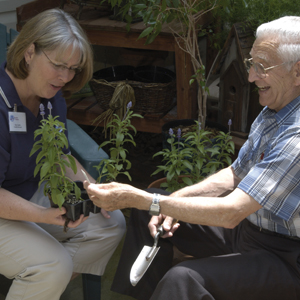Herbal Gardening and Its Benefits
You don't need a green thumb to reap the benefits of herbs — cancer-fighting antioxidants, valuable nutrients, fat-free flavor, and more.
You don't need a green thumb or a huge plot of land to reap the benefits of growing fresh herbs. Not only are herbs versatile and capable of lending great flavor to foods, and as natural remedies that benefit personal health and beauty, but the specific act of growing an herbal garden itself helps in many ways, especially for seniors.
Planting an herb garden is a wonderful way to enjoy the sights, smells and tastes of a wide variety of plants. Fresh herbs are often easy to cultivate and can grow in a small garden in the back yard, in pots on an outdoor patio or sunroom, or even in a window box inside a kitchen. Gardening is a terrific hobby and allows your senior loved one an opportunity to show his or her creativity. It is a great activity that can be shared with others like grandchildren, with friends in a club as a social activity, or even alone. Not only is gardening relaxing but it also improves hand-eye coordination, motor skills and self-esteem.
Herbs have many values but a few of the most common uses include aromatherapy, medicinal, as seasonings and flavorings in foods and beverages, and in salads. Many herbs are chockfull of cancer-fighting antioxidants, valuable nutrients, fat-free flavor, and more. Before beginning any herbal treatment, caregivers should check with their senior's doctor to make certain that it does not interfere with medications that he or she may already be taking.
The word Aromatherapy is derived from 'aroma' meaning fragrance or smell, and 'therapy' meaning treatment. This ancient herbal art can enhance health in many ways. It is a stress reliever and mood enhancer and can be successful in treating minor disorders. Some examples are to stimulate the immune system and strengthen your body's ability to resist disease and infections, to alleviate digestive problems like constipation and abdominal spasms, to enhance the respiratory system to treat coughs, sinusitis and tonsillitis, to ease muscular pain by promoting relaxation and toning, improving circulation and lowering blood pressure, combating stress-related disorders like insomnia and tension headaches, and even in treating anxiety, depression, and grief. Think of growing and using relaxing herbs such as chamomile, lavender or mint, rosemary, oregano, thyme, chive and sage for this purpose. The herbs can be dried and used in potpourri, simmered in pot on the stove to release their fragrance, hung upside down and used as natural air freshener, wrapped in a gauze bag and used in a bath or even dried and steeped to make herbal tea.
In the medicinal world, herbs have been used for centuries to help with a variety of ailments. (Again, it's important to check with your senior's doctor before using any herbs for medicinal purposes.) 'Old fashioned remedies' are for the most part herb based and have been used for generations to help with conditions from upset stomachs to anxiety and even strengthening the immune system. The first apothecaries (pharmacies) were stocked with botanical ingredients. Garlic is considered to be good for the heart and cholesterol conditions and has been shown in studies to possess anti-bacterial an anti-viral properties effective in boosting the immune system and fighting all types of infections. Lemon balm, lavender, and marjoram can calm nerves and reduce anxiety. And peppermint is soothing and settling to a 'sour stomach.' 'The wise, old herbs,' as sage and rosemary are known, have been shown in studies to enhance brain function and may help to ward away Alzheimer's disease.
Seasonings are of course the most common uses of herbs found in any herb garden. Herbs add a lot of flavor to recipes besides providing various health benefits. No herb garden would be complete without basil, oregano, sage, thyme, chives or mint to season up dinner each and every night. Consider planting some lemon basil, lemon thyme, Thai thyme or another variation of any number of great herbs that offer different flavors. Use the herbs in cooking. You can add delicious, healthy herbs to marinades, sauces and soups. Herbal vinegars are not only decorative but mineral-rich as well.
Salads can be made with many herbs and are a special treat during the spring and summer months. Consider a borage with some mesclun lettuces topped with some chives, dill, oregano and basil. It doesn't have to stop there, many herbs lend themselves to being eaten in their raw form and add great flavor to any salad.
When looking for a healthy remedy to help your senior stay engaged, active and healthy, a small herb garden can be just what the doctor ordered in more ways than one!
References
'Health Benefits of Gardening', by the editors of PureHealthMD, DiscoveryFit&Health.com
'Health Benefits of Planting an Herb Garden', By Marc Courtiol, Natural Health Journals, NaturalHealthJournals.com
'Therapeutic Benefit of Aromatherapy' by Angi Kocsi, spasincanada.ca
"To grow old and healthy eat those old brain-favouring herbs', by Angi Kocsi, spasincanada.ca
"Aromatherapy - a World of Fragrance', by Angi Kocsi, spasincanada.ca
"The Multitude of Benefits from an Herb Garden', by Linda L. Kinyon, Yahoo! Contributor Network, May 28, 2012, Yahoo!.com
Sign up to receive helpful info right to your inbox.
We understand choosing an in-home care provider can be a difficult decision, and we want to make your journey as easy as possible. We're here to support you by providing helpful senior care tips and information on in-home care and senior health and wellbeing topics.
Start a Job with a Purpose
Uplifting training and support for you every step of the way.
Apply to be a caregiver







